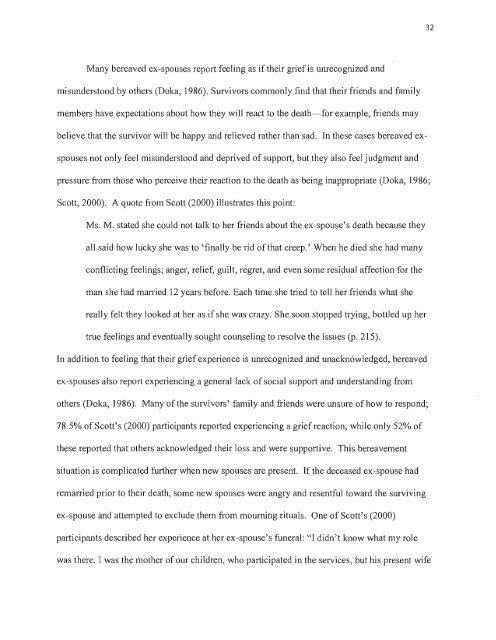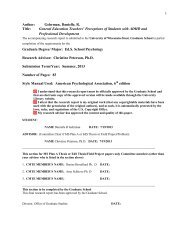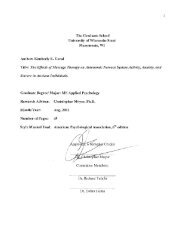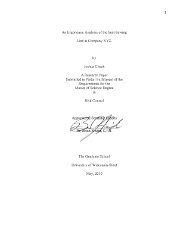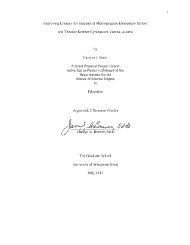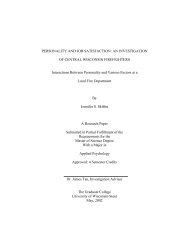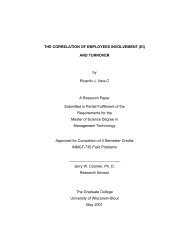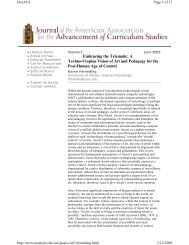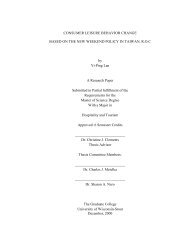A Review of the Literature on Three Types of Disenfranchised Grief ...
A Review of the Literature on Three Types of Disenfranchised Grief ...
A Review of the Literature on Three Types of Disenfranchised Grief ...
You also want an ePaper? Increase the reach of your titles
YUMPU automatically turns print PDFs into web optimized ePapers that Google loves.
Many bereaved ex-spouses repOli feeling as if <str<strong>on</strong>g>the</str<strong>on</strong>g>ir grief is unrecognized and<br />
misunderstood by o<str<strong>on</strong>g>the</str<strong>on</strong>g>rs (Doka, 1986). Survivors comm<strong>on</strong>ly fmd that <str<strong>on</strong>g>the</str<strong>on</strong>g>ir friends and family<br />
members have expectati<strong>on</strong>s about how <str<strong>on</strong>g>the</str<strong>on</strong>g>y will react to <str<strong>on</strong>g>the</str<strong>on</strong>g> death-for example, friends may<br />
believe that <str<strong>on</strong>g>the</str<strong>on</strong>g> survivor will be happy and relieved ra<str<strong>on</strong>g>the</str<strong>on</strong>g>r than sad. In <str<strong>on</strong>g>the</str<strong>on</strong>g>se cases bereaved ex<br />
spouses not <strong>on</strong>ly feel misunderstood and deprived <str<strong>on</strong>g>of</str<strong>on</strong>g> support, but <str<strong>on</strong>g>the</str<strong>on</strong>g>y also feel judgment and<br />
pressure from those who perceive <str<strong>on</strong>g>the</str<strong>on</strong>g>ir reacti<strong>on</strong> to <str<strong>on</strong>g>the</str<strong>on</strong>g> death as being inappropriate (Doka, 1986;<br />
Scott, 2000). A quote from Scott (2000) illustrates this point:<br />
Ms. M. stated she could not talk to her friends about <str<strong>on</strong>g>the</str<strong>on</strong>g> ex-spouse's death because <str<strong>on</strong>g>the</str<strong>on</strong>g>y<br />
all said how lucky she was to 'finally be rid <str<strong>on</strong>g>of</str<strong>on</strong>g> that creep.' When he died she had many<br />
c<strong>on</strong>flicting feelings; anger, relief, guilt, regret, and even some residual affecti<strong>on</strong> for <str<strong>on</strong>g>the</str<strong>on</strong>g><br />
man she had married 12 years before. Each time she tried to tell her friends what she<br />
really felt <str<strong>on</strong>g>the</str<strong>on</strong>g>y looked at her as ifshe was crazy. She so<strong>on</strong> stopped trying, bottled up her<br />
true feelings and eventually sought counseling to resolve <str<strong>on</strong>g>the</str<strong>on</strong>g> issues (p. 215).<br />
In additi<strong>on</strong> to feeling that <str<strong>on</strong>g>the</str<strong>on</strong>g>ir grief experience is umecognized and unacknowledged, bereaved<br />
ex-spouses also repOli experiencing a general lack <str<strong>on</strong>g>of</str<strong>on</strong>g> social support and understanding from<br />
o<str<strong>on</strong>g>the</str<strong>on</strong>g>rs (Doka, 1986). Many <str<strong>on</strong>g>of</str<strong>on</strong>g> <str<strong>on</strong>g>the</str<strong>on</strong>g> survivors' family and friends were unsure <str<strong>on</strong>g>of</str<strong>on</strong>g> how to resp<strong>on</strong>d;<br />
78.5% <str<strong>on</strong>g>of</str<strong>on</strong>g> Scott's (2000) participants reported experiencing a grief reacti<strong>on</strong>, while <strong>on</strong>ly 52% <str<strong>on</strong>g>of</str<strong>on</strong>g><br />
<str<strong>on</strong>g>the</str<strong>on</strong>g>se reported that o<str<strong>on</strong>g>the</str<strong>on</strong>g>rs acknowledged <str<strong>on</strong>g>the</str<strong>on</strong>g>ir loss and were supportive. This bereavement<br />
situati<strong>on</strong> is complicated fur<str<strong>on</strong>g>the</str<strong>on</strong>g>r when new spouses are present. If <str<strong>on</strong>g>the</str<strong>on</strong>g> deceased ex-spouse had<br />
remarried prior to <str<strong>on</strong>g>the</str<strong>on</strong>g>ir death, some new spouses were angry and resentful toward <str<strong>on</strong>g>the</str<strong>on</strong>g> surviving<br />
ex-spouse and attempted to exclude <str<strong>on</strong>g>the</str<strong>on</strong>g>m from mourning rituals. One <str<strong>on</strong>g>of</str<strong>on</strong>g> Scott's (2000)<br />
participants described her experience at her ex-spouse's funeral: "I didn't know what my role<br />
was <str<strong>on</strong>g>the</str<strong>on</strong>g>re. I was <str<strong>on</strong>g>the</str<strong>on</strong>g> mo<str<strong>on</strong>g>the</str<strong>on</strong>g>r <str<strong>on</strong>g>of</str<strong>on</strong>g> our children, who participated in <str<strong>on</strong>g>the</str<strong>on</strong>g> services, but his present wife<br />
32


